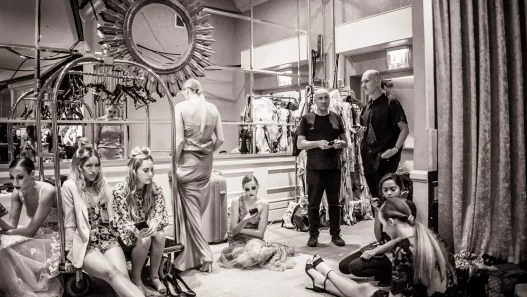INTRODUCTION
In the current saturated digital world, brands have a hard time catching the attention of consumers. With innumerable product options available and skepticism toward traditional advertising on the rise, consumers today find it hard to believe any message. So on one hand, they share news and opinions among peers and friends, while on the other hand, they block ads.
The trust deficit, then, is where influencer marketing picks up speed. Instead of glamorous celebrity endorsements, influencers build trust with their audiences over time, which makes their recommendations seem authentic and relatable. Consumers may not trust big brands, but they trust the people next door who seem to share their lifestyle or values.
It is essential for brands to work with the right influencer, as that influencer lingers in people’s minds and shapes their impressions based upon his or her point of view. Promotion is not what successful influencers are about; they blend products naturally into stories with genuine resonance. There has been a huge trust shift toward influencers, notably among Gen Z and millennials, which has been rising confidently over the years.
With this backdrop, the definition of an influencer is constantly changing. An influencer today can be anyone who creates compelling and entertaining content, whatever the size of their audience. Relatability, intelligence, and authenticity mean far more in driving trust than content which is aspirational. The changes in consumer behaviour reveal that influencer marketing is on the rise, making it one of the strongest tools in the digital age.
LEGAL FRAMEWORK GOVERNING INFLUENCER MARKETING
- Endorsement Guidelines for Celebrities and Social Media Influencers
In the year 2023, the Department of Consumer Affairs under the Ministry of Consumer Affairs, Food and Public Distribution has published the endorsement guidelines for celebrities and social media influencers. [1]The social media influencer market in India, valued at ₹1275 crore in the past year, is expected to be worth ₹2800 crore by 2025. With over 100,000 influencers exerting considerable influence on consumer decision-making, the regulatory checks seem justified. [2]
Endorsers are required to be honest about any material connection with the brands, whether monetary, free samples, publicity, or other incentives. Disclosures should be made conspicuously and use terms such as “advertisement”, “sponsored”, or “paid promotion“. Other product endorsements are fine, as long as the influencer has actually used or experienced them, therefore ensuring credibility.
The penalties for violation range from ₹10 lakh for the first offense to ₹50 lakh for repeat offenders. A repeat offender shall be banned or imprisoned for six months to two years. The violation of these guidelines shall be violated under the authority of the CCPA, under the Consumer Protection Act, 2019, in order to prevent misleading advertisements and protect the interest of consumers.
- Consumer Protection Act, 2019
The Consumer Protection Act of 2019 [3]is concerned with the regulation of influencer marketing while providing adequate transparency and protection of consumer interests. The Act elaborates on consumer rights and makes endorsers responsible for misleading acts.
KEY PROVISIONS:
- Endorsements (Section 2(18)): [4]Endorsements include any statement made orally, demonstrations, or depictions by a person who, in fact, acts as someone whose view is being solicited by the consumers.
- Misleading Advertisement (Section 2(28)): [5]Misleading advertisements are anything false or misleading that may mislead a consumer.
- Regulatory Surveillance (Section 21): The [6]CCPA can, on its own or on application, investigate and take action against false advertisements that are misleading.
- Penalties (Section 89): [7]Tough penalties can be imposed on influencers who fail to make full disclosures related to endorsement contracts.
Misleading endorsements can be also classified as unfair trade practices, and therefore, influencers as service providers can be questioned legally. Consumers are entitled to file complaints with the Consumer Dispute Redressal Commission claiming to have been misled by the marketing efforts of promoters.
- Advertising standards council of India (ASCI)
- The Advertising Standards Council of India (ASCI) [8]recently brought in guidelines for effective influencer marketing. Transparency should be maintained without any confusion. For example, paid collaborations through influencers should clearly be disclosed using hashtags like #Ad or #Sponsored.
- Failure may invite legal action under the Consumer Protection Act or reputational damage in the form of public embarrassment. The complaints are reviewed by the CCC of ASCI, and if found valid, the influencer or brand needs to change or withdraw the misleading advertisement.
- Guidelines for prevention of misleading advertisements and endorsement for misleading advertisments 2022
The Central Consumer Protection Authority CCPA has recently brought forth the Guidelines for Prevention of Misleading Advertisements and Endorsements, 2022[9], in a move to completely dispose of deceitful advertisement and safeguard the interests of the consumers. These guidelines prevent the advertisements that mislead consumers through over-exaggerated claims, false promises, or distortion of fact, thereby ensuring their rights of information, choice, and safety.
For the first time, the government has defined clear parameters for valid advertisements, covering bait marketing, surrogate promotions, and disclaimers. Special provisions restrict misleading advertisements targeting children, prohibiting endorsements by celebrities in industries requiring health warnings.
The guidelines make sure that all the disclaimers are of the same language and font used in the original advertisement so as not to conceal essential information. Before endorsing a product or service, advertisers, manufacturers, and influencers must first conduct due diligence.
Violations invite strict penalties – fines up to ₹10 lakh, increasing to ₹50 lakh for repeat offenses. CCPA also retains the power to ban endorsers from promoting products for up to three years in case of repeated non-compliance.
THE GREY AREAS OF INFLUENCER MARKETING REGULATIONS
Lack of awareness: many influencers are unaware of legal obligations
One major difficulty in overseeing influencer marketing is the widespread lack of legal awareness among creators. Many influencers, especially newcomers, prioritize brand deals and audience engagement without fully grasping their obligations under advertising regulations.
Lack of transparency: Another frequently encountered problem is a lack of transparency in the disclosure of paid partnerships. Not all influencers are aware, or may choose not to use, explicit labels such as #Ad or #Sponsored and it can become confusing for consumers trying to distinguish between organic content and promotions. These mistakes result in financial ramifications, reputational damage, or even prohibitions for future endorsement.
The third challenge is finding subtle advertising strategies. It becomes difficult for audiences -and even regulators -to know when they are being marketed to because of the way promotional content is smoothly blended into regular posts. Misleading claims can sometimes not be outright false but rely on exaggerations or selective omissions, which makes it even more challenging to enforce.
These challenges must be addressed by raising awareness through influencer training, enforcing strict brand disclosure policies, and more effective monitoring mechanisms to foster a transparent and accountable digital marketing landscape.
Misconception About Accountability:
Most influencers work based on the misconceived notion that liability for misrepresentation in ads lies with a brand, completely ignoring the fact that endorsers can also be held liable based on the principles of the Consumer Protection Act, 2019 and ASCI guidelines. That is because a traditional model was used in advertisement, where mainly the company held liability, but the celebrity or endorser was just promoting.
However, with current laws, influencers are supposed to fact-check and ensure the claims are true before promoting any product or service. With misleading advertisements, influencers may suffer penalties such as hefty fines and bans from providing further sponsorships. This can apply not only to direct violation but also indirect, so ignorance cannot plead not guilty.
One of the major issues is due diligence; most influencers do not carry out independent research on the legitimacy of the products they are promoting. For example, endorsing a skincare product without verifying its claimed benefits or a financial service without understanding the risks can mislead consumers, making influencers legally vulnerable.
This risk can be mitigated by the adoption of responsible marketing practices, such as fact-checking brand claims, transparently disclosing partnerships, and adherence to regulatory guidelines. Further bridging this knowledge gap can be achieved through legal awareness campaigns, industry workshops, and clearer contractual obligations between brands and influencers.
CASE LAWS ON MISLEADING ADVERTISEMENTS AND INFLUENCER ACCOUNTABILITY
Patanjali Ayurveda Ltd. v. ASCI
ASCI took the action against Patanjali for false claims associated with its product that call attention to the level of transparency in advertisements. False ads not only mislead consumers but also affect brand credibility. [10]The Consumer Protection Act of 2019, under Section 21, [11]provides the CCPA with provisions to enquire into and impose penalties on false or misleading advertisements whereas Section 89 [12]applies to endorsers who make false promotions. ASCI allows the consumer further to report deceptive influencer advertising to further entrench accountability in digital marketing.
Marico Ltd. v. Abhijeet Bhansali
YouTuber Abhijeet Bhansali uploaded a video claiming that Marico’s Parachute Coconut Oil was adulterated. The court held that influencers should authenticate a statement before making it in public because false content can harm a brand’s reputation and dent consumers’ trust in the brand[13]. This case was exemplary evidence of the liability of influencers, as it made it clear that digital content contributors cannot make unsubstantiated claims under the blanket of opinion.
Both the cases highlight the need for authentic reviews, legal consequences of deceptive advertising, and an increasing requirement to tighten regulations on influencer marketing.
CONCLUSION
Influencer marketing is rapidly growing, but it has its challenges that require attention. Most influencers do not fully understand their legal responsibilities and often assume that only brands are liable for misleading advertisements. However, laws like the Consumer Protection Act, 2019, and ASCI guidelines clearly state that endorsers can also face penalties for false or exaggerated claims.
Misrepresentative advertisements, no matter through intention or not, can influence and drop consumer confidence, damage brand reputation, and bring about legal consequences. For example, in cases of Patanjali Ayurveda v. ASCI and Marico v. Abhijeet Bhansali, false advertisement may seem to be working against them. Influencers must also be cautious about what they endorse because honest endorsements and transparent appreciation are what they need.
These issues will only be dealt with by improving awareness, stringent enforcement, and rules for proper disclosure. In that way, through the combined effort of influencers, brands, and regulators, consumers will get a fair and trustworthy digital space, relying on truthful and responsible advertising.
Sources:
[1] Ministry of Consumer Affairs, Food & Public Distribution, Press Release, Centre Releases Guidelines for Celebrities, Influencers and Virtual Influencers on Social Media (Jan. 20, 2023), https://consumeraffairs.nic.in/pressrelease/centre-releases-guidelines-celebrities-influencers-and-virtual-influencers-social-media
[2] Times of India, Product Promotions: Govt Makes it Mandatory for Social Media Influencers to Disclose Material Interest, Times of India (Dec. 9, 2022), https://timesofindia.indiatimes.com/product-promotions-govt-makes-it-mandatory-for-social-media-influencers-to-disclose-material-interest/articleshow/97174246.cms
[3] Consumer Protection Act, 2019, No. 35 of 2019, INDIA CODE (2019)
[4] Consumer Protection Act, 2019, § 2(18) (India).
[5] Consumer Protection Act, 2019, § 2(28) (India).
[6] Consumer Protection Act, 2019, § 21 (India).
[7] Consumer Protection Act, 2019, § 89 (India).
[8] Advertising Standards Council of India, Influencer Resource, https://www.ascionline.in/influencer-resource/
[9] Press Information Bureau, Government of India Issues Guidelines for Celebrities, Influencers, and Virtual Influencers on Social Media (Feb. 16, 2023), https://pib.gov.in/PressReleasePage.aspx?PRID=1832906.
[10] Patanjali Ayurveda Limited v. Advertising Standards Council of India (ASCI), (2017). ASCI Complaint No. 1234/2017.
[11] Consumer Protection Act, 2019, § 21 (India).
[12] Consumer Protection Act, 2019, § 89 (India).
[13] Marico Ltd. v Abhijeet Bhansali 2020 (81) PTC 244 (Bom).
Author:

















